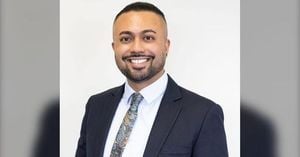Francesca Mannocchi, a journalist and writer living with multiple sclerosis, recently shared her harrowing experience with Italy's public healthcare system on social media, highlighting significant delays in accessing essential medical examinations. Her post, which quickly went viral, resonated with many who face similar challenges in the Lazio region.
Mannocchi detailed her struggles in a candid Instagram post, explaining that every six months, she requires treatment with Ocrelizumab and must undergo a series of tests, including an MRI, to monitor her condition. "Every six months, I have to do my therapy and repeat a long series of tests and an MRI to see if this disease is stable or not," she wrote, underscoring the urgency of her medical needs.
However, when Mannocchi attempted to schedule her MRI through the regional healthcare call center, she encountered a frustrating situation. For days, she was met with busy signals and pre-recorded messages urging her to call back later. Finally, on April 1, 2025, she received an answer: the first available MRI appointment was not until July 2025, located in Frosinone, a province 90 kilometers from her home.
Faced with this unacceptable wait, Mannocchi turned to a private clinic, where she was offered an appointment within two days for a cost of 680 euros. "I have the fortune to be able to afford it," she lamented, emphasizing the stark reality that many others in her situation might not have that option. "It’s how democracies are dismantled," she stated, reflecting on the erosion of rights that should be guaranteed under the Italian Constitution.
Mannocchi's poignant message included a reference to Article 32 of the Italian Constitution, which declares, "The Republic protects health as a fundamental right of the individual and interest of the community, and guarantees free care to the indigent." Her post garnered over 52,000 likes and nearly 1,100 comments within hours, with many expressing solidarity and frustration over the healthcare system.
Notable figures in the media and politics responded to Mannocchi's post, including fellow journalist Francesca Fagnani, who simply commented, "You are right. Unfortunately." Other public figures, like Serena Dandini, expressed their anger through emoticons, while Mario Calabresi thanked Mannocchi for sharing her story.
In response to Mannocchi’s public outcry, Emanuela Droghei, a regional councilor from the Democratic Party, pointed out the harsh reality many citizens face in Lazio: "The truth is simple and cruel: in Lazio today, you can only get treatment if you can afford it. Others wait or give up. The right to health becomes a privilege," she stated, calling for urgent reforms in the healthcare system.
The Lazio regional government, led by President Francesco Rocca, issued a statement addressing the situation. They clarified that Mannocchi's prescription had been classified under a priority category labeled "altro," which meant it could not be scheduled through normal channels. The administration acknowledged that the Sant'Andrea hospital, which was responsible for Mannocchi's care, had made an error in processing her appointment.
To mitigate the long wait times, the regional authorities provided alternative appointment availabilities, including:
- Villa Betania (Rome) for an MRI on May 23, 2025, at 8:00 AM and May 29, 2025, at 7:30 PM;
- Poliambulatorio Policlinico Di Liegro (Rome) for an MRI on May 27, 2025, at 4:00 PM;
- Policlinico Casilino (Rome) for an MRI on April 3, 2025, at 3:40 PM.
Despite these reassurances, the ongoing issue of lengthy waiting lists in the public healthcare system remains a pressing concern for many residents in Lazio. Critics argue that the healthcare system should not force individuals to choose between financial strain and their health.
President Rocca expressed his regret over Mannocchi's experience, stating, "I am sincerely sorry for what happened to Francesca Mannocchi, just as I am every time a citizen faces a similar problem. The communication error that led to this intolerable inconvenience has been immediately corrected." He emphasized that addressing waiting lists is a top priority for his administration.
Yet, the opposition parties are not satisfied with these assurances. Emanuela Droghei reiterated that the situation Mannocchi faced is indicative of a larger systemic failure: "The public healthcare system cannot become the last resort for those without alternatives. We will continue to denounce every service failure and defend the right to care for everyone."
As Mannocchi's story continues to circulate, it serves as a stark reminder of the challenges faced by many in accessing timely healthcare in Italy. The public's response reflects a growing frustration with a system that should guarantee health as a right, yet often leaves vulnerable individuals at the mercy of financial constraints.









